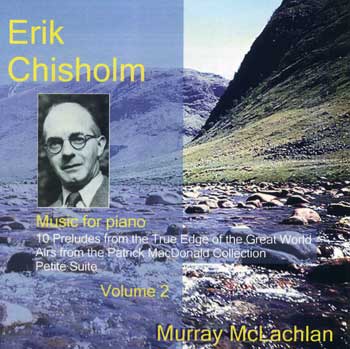Eric Chisholm: Music for Piano, Vol. 2
from 24 Preludes from the True Edge of the Great World
Track 1: Port a Beul
Track 2: Song of the Mavis
Track 3: Sea-sorrow
Track 4: The Shelling
Track 5: Sea Tangle
Track 6: Spinning Song
Track 7: Ossianic Lay
Track 8: Stravalging
Track 9: Rudha Bàn
Track 10: The Hour of the Sluagh
Airs from the Patrick MacDonald Collection
Track 11: i Allegro
Track 12: ii Legato
Track 13: iii comodo
Track 14: iv Rubato
Track 15: v Adagio
Track 16: vi Poco allegretto
Track 17: vii Fadilegan sgarba
Track 18: viii Andante
Track 19: ix Andante maestoso
Track 20: x (untitled)
Track 21: xi Allegro scherzando
Track 22: xii (untitled)
Track 23: xiii (untitled)
Track 24: xiv (untitled)
Track 25: xv Slow
Track 26: xvi Rather slow
Track 27: xvii Slow
Track 28: xviii Very slow
Track 29: xix Lively
Track 30: xx Andante
Track 31: xxi Rather slow
Track 32: xxii Very expressive
Track 33: xxii Slow Strathspey
Track 34: xxiv Strong and Deliberate
Track 35: xxv Slow
Track 36: xxviPrince Albert’s March
Petite Suite
Track 37: 1. Harris Dance
Track 38: 2. Mermaid’s Song
Track 39: 3. Skye Dance
Track 40: 4. Milking Croon
Track 41: 5. Love of my Youth
Track 42: 6. Och o ro u
Total Playing Time: 78.42
About
Erik Chisholm (1904-1965)
“I have a hunch that I would like to end my musical days in Scotland.”
Erik Chisholm probably had no idea how close he was to the end of all his days when he made the above remark. Though he died in South Africa, his musical days did indeed end in Scotland, and it was certainly in Scotland that they began, as this CD demonstrates.
Chisholm was born in Glasgow and brought up in what might be described as a conventional middle-class household, but it was hardly conventional of his parents to allow him to leave school at the age of thirteen to pursue composition, piano and organ studies. He had started composing variations on a Scottish folk-tune at the age of six, but it was at the age of ten that he was given a copy of Patrick MacDonald’s A Collection of Scottish Airs published in 1784. So influential was this gift that scarcely a single one of the 200 airs remained unarranged by Chishoim in one form or another, and many of these can be heard on Volume 1 of this series (DDV24131) as well as on this CD. Patrick MacDonald was not Chisholm’s only source of Scottish traditional music. He made use of early Scottish lute manuscripts and knew the work of Marjory Kennedy-Fraser. For the Preludes From the True Edge of the Great World he drew from Amy Murray’s ‘Father Allan’s Island’, and he had a broad knowledge of piobaireahcd — the classical music for the Highland bagpipe.
Young Erik studied piano with Pouishnoff and later became a Doctor of Music under the tuition of Donald Tovey. He was a fine pianist and his understanding of piano texture and technique is evident in all his piano works, from the simplest to the most virtuosic. He was also an outstanding organist and an innovative conductor and concert promoter. Amongst others, he brought Hindemith, Casella, Walton and Bartok to Glasgow. He was dubbed “MacBartok” not because his music could ever be confused with Bartôk’s, but because he was pursuing a similar compositional course in his handling of Scottish traditional music as did Bartok with the Central European tradition.
Chisholm was also greatly influenced by Hindustani music, following his friendship with Sorabji and a period of service in the Far East during the Second World War. He founded a symphony orchestra in Singapore, and from there went straight to Cape Town, where he was Professor and Dean of the Faculty of Music until his untimely death.
Everything on this CD has its origins in the traditional music of north-west Scotland. Chisholm was not the first to explore this vast and fascinating repertoire. Marjory Kennedy-Fraser’s Songs of the Hebrides had been immensely influential and achieved international success, but her sophisticated drawing-room versions seem somewhat dated almost a century after they appeared and her alterations to the vocal lines and the lyrics now seem misplaced. Chisholm, however, did not always feel obliged to respond to the titles or subject matter of his originals, though he often did so with wonderful insight and sympathy. Where Kennedy-Fraser was an arranger, he was a composer. His technical vocabulary and knowledge of the keyboard alone put his work in a different class, but it is his inventiveness and daring that gives these reworkings their amazing and varied vitality.

